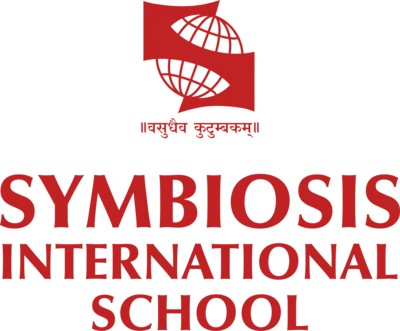

The Primary Years Programme (PYP) is an internationally recognised, IB authorised, inquiry-based curriculum framework designed for students in the age group of 3 to 11 years (Early years 1 to Grade 5). The PYP strives to balance the acquisition of Subject knowledge and conceptual understanding along with the development of requisite skills, attributes and dispositions, thus leading to the child’s overall development. The primary pedagogical approach in the PYP is through student inquiry and collaboration, where students ask/ develop conceptual questions, conduct research, share their findings and take meaningful action.
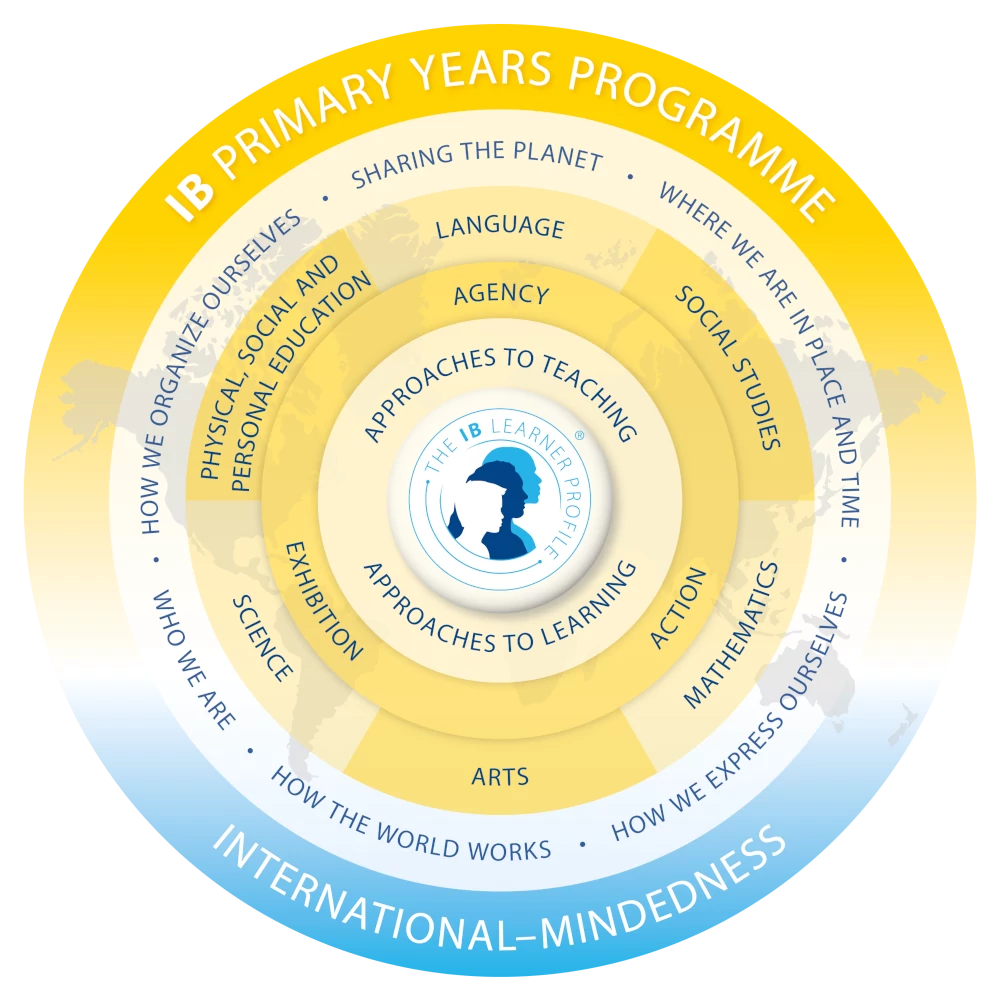
The PYP Curriculum framework centres on transdisciplinary learning as the curriculum organizer for students to experience learning between, across and beyond traditional subject boundaries. The curriculum framework includes 5 essential elements: Knowledge, Skills (ATLs), Concepts, Learner Profile attributes and Action. The PYP prepares students to become active, caring, lifelong learners who demonstrate respect for themselves and others. The Curriculum is organised as a Program of Inquiry (POI) under six Transdisciplinary Themes, that are explored across different age groups. Supporting the exploration of these themes are six subject areas: Language, Mathematics, Science, Social studies, Arts, Physical, Social and Personal Education (PSPE) A well-designed programme of inquiry ensures students gain a balance of subject-specific knowledge, conceptual understandings and skills, alongside opportunities to develop the attributes of the IB learner profile and to take action.
The PYP curriculum framework emphasizes the central principle of Agency that is threaded throughout the three pillars of the curriculum: the Learner, Learning and teaching and the Learning community.
The Curriculum is delivered through Units of Inquiry. These Units of Inquiry at different grade levels make up the PYP Program of Inquiry (POI)

The Six Transdisciplinary themes capture human commonalities that are significant and relevant across cultures, geographic regions and student learning stages.
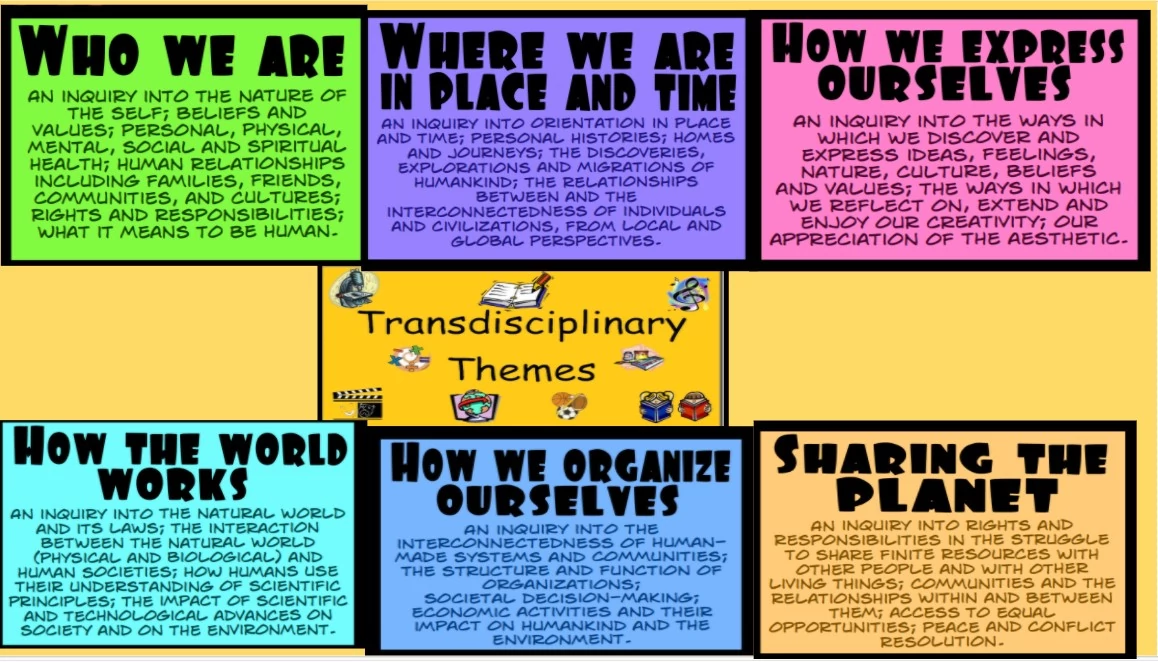
Supporting the exploration of the transdisciplinary themes are six subject knowledge areas:
In the PYP, mathematics is viewed primarily as a vehicle to support inquiry, providing a global language through which we make sense of the world around us. It is intended that students become competent users of the language of mathematics, and can begin to use it as a way of thinking, as opposed to seeing it as a series of facts and equations to be memorized. Wherever possible, mathematics is taught through the relevant context of the units of inquiry. The mathematics knowledge component is arranged into five strands:
Language is the major connecting element across the curriculum and plays a vital role in the construction of meaning. Language learning in the PYP involves
as learners listen to and use language with others in their everyday lives
as learners grow in their understanding of how language works and
as learners use language as a tool to listen, think, discuss and reflect on information, ideas and issues
Language also provides a vehicle for inquiry. Language in the PYP consists of three strands:
Acquisition of more than one language enriches personal development and helps facilitate international-mindedness.
Students at SIS have the option to choose between Hindi, French or Spanish as an additional language right from Grade 1. Marathi is a compulsory State requirement and is taught from Grade 1 to Grade 5 in the PYP.
SIS provides English as a Second Language (ESL) Programme to students whose first language is not English and whose English language competency does not meet the grade level requirements. The students are evaluated and placed in beginning, intermediate or advanced ESL classes. The ESL department collaborates with the classroom facilitators to implement strategies and instructional practices, which focus on specific language and content targets.
The Science component of the curriculum is considered to be driven by concepts and skills as a Guided inquiry. Science provides opportunities for students to engage in scientific investigations by making accurate observations, handling tools, recording and comparing data, and formulating explanations using their own scientific experiences.The knowledge component in Science is arranged into four strands as described below
| Living things | The study of the characteristics, systems and behaviours of humans and other animals, and of plants; the interactions and relationships between and among them, and with their environment |
| Earth and space | The study of planet Earth and its position in the universe, particularly its relationship with the sun; the natural phenomena and systems that shape the planet and the distinctive features that identify it; the infinite and finite resources of the planet. |
| Materials and matter | The study of the properties, behaviours and uses of materials, both natural and human-made; the origins of human-made materials and how they are manipulated to suit a purpose. |
| Forces and energy | The study of energy, its origins, storage and transfer, and the work it can do; the study of forces; the application of scientific understanding through inventions and machines. |
Arts are integral to the PYP. In SIS, Arts are identified as drama, music and visual arts. Arts provide students with a wide range of opportunities and means to respond to their experiences and engage with historical, social and cultural perspectives. As a medium of inquiry, Arts provide opportunities for learning, communication and expression. Through engaging with and creating artworks, learners are encouraged to reconsider familiar concepts and think about issues of culture and identity. By responding to the work of other artists, they are invited to situate their own creativity within a broader context.
Personal, social and physical education (PSPE) is concerned with the individual’s well-being and Well-being is intrinsically linked to all aspects of a student’s experience at school and beyond. The development of overall well-being is defined through three common strands given below:
| Identity | An understanding of our own beliefs, values, attitudes, experiences and feelings and how they shape us; the impact of cultural influences; the recognition of strengths, limitations and challenges as well as the ability to cope successfully with situations of change and adversity; how the learner’s concept of self and feelings of self-worth affect his or her approach to learning and how he or she interacts with others |
| Active living | An understanding of the factors that contribute to developing and maintaining a balanced, healthy lifestyle; the importance of regular physical activity; the body’s response to exercise; the importance of developing basic motor skills; understanding and developing the body’s potential for movement and expression; the importance of nutrition; understanding the causes and possible prevention of ill health; the promotion of safety; rights and the responsibilities we have to ourselves and others to promote well-being; making informed choices and evaluating consequences, and taking action for healthy living now and in the future |
| Interactions | An understanding of how an individual interacts with other people, other living things and the wider world; behaviours, rights and responsibilities of individuals in their relationships with others, communities, society and the world around them; the awareness and understanding of similarities and differences; an appreciation of the environment and an understanding of, and commitment to, humankind’s responsibility as custodians of the Earth for future generations |
Five categories of interrelated skills aim to support students of all ages to become self-regulated learners who know how to ask good questions, set effective goals and pursue their aspirations.
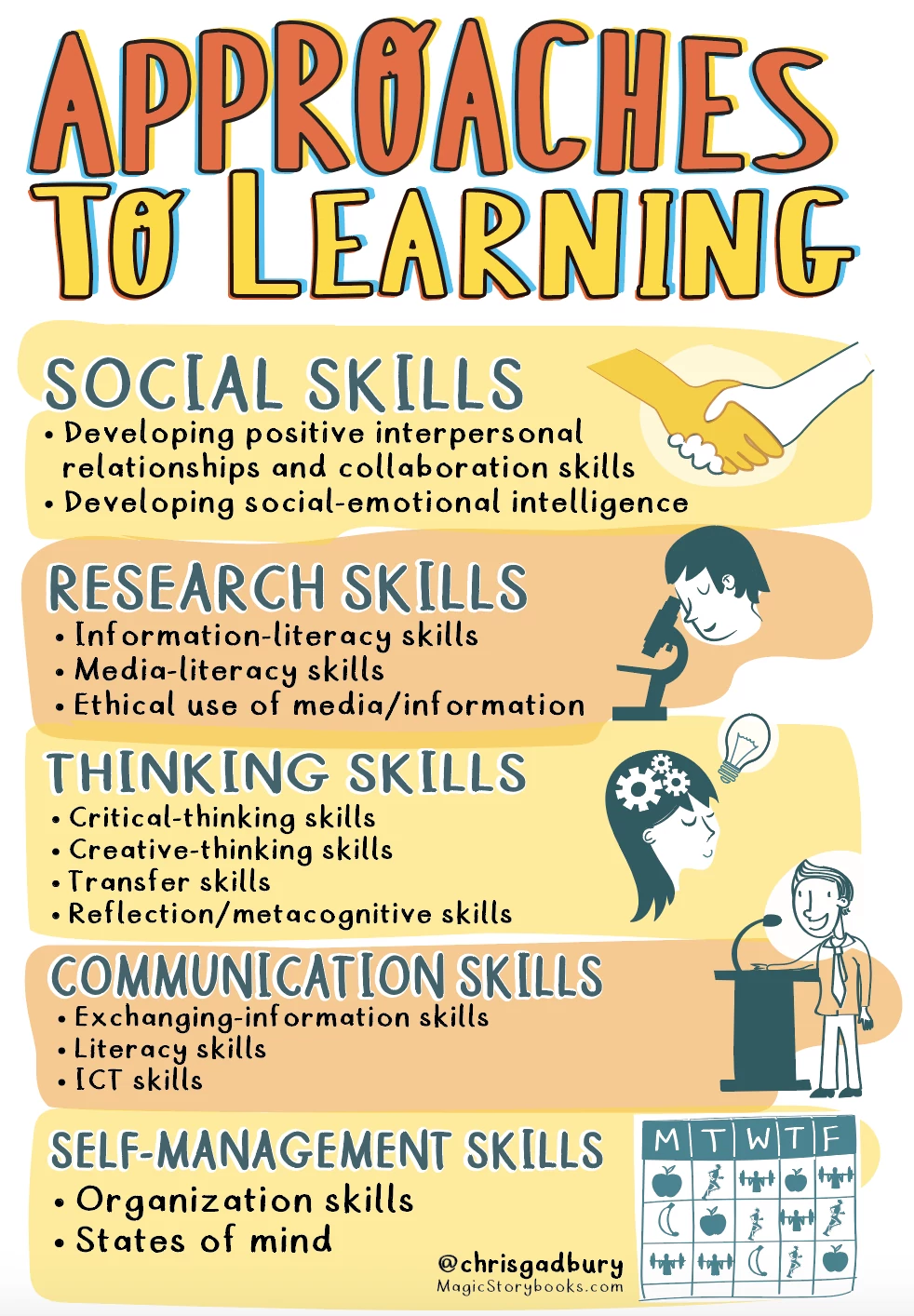
Concepts are broad & abstract ideas that drive student inquiries. The key concepts are central to the curriculum and are presented in the form of key questions.
.webp)
The IB learner profile is the IB mission statement translated into a set of learning outcomes for the 21st century
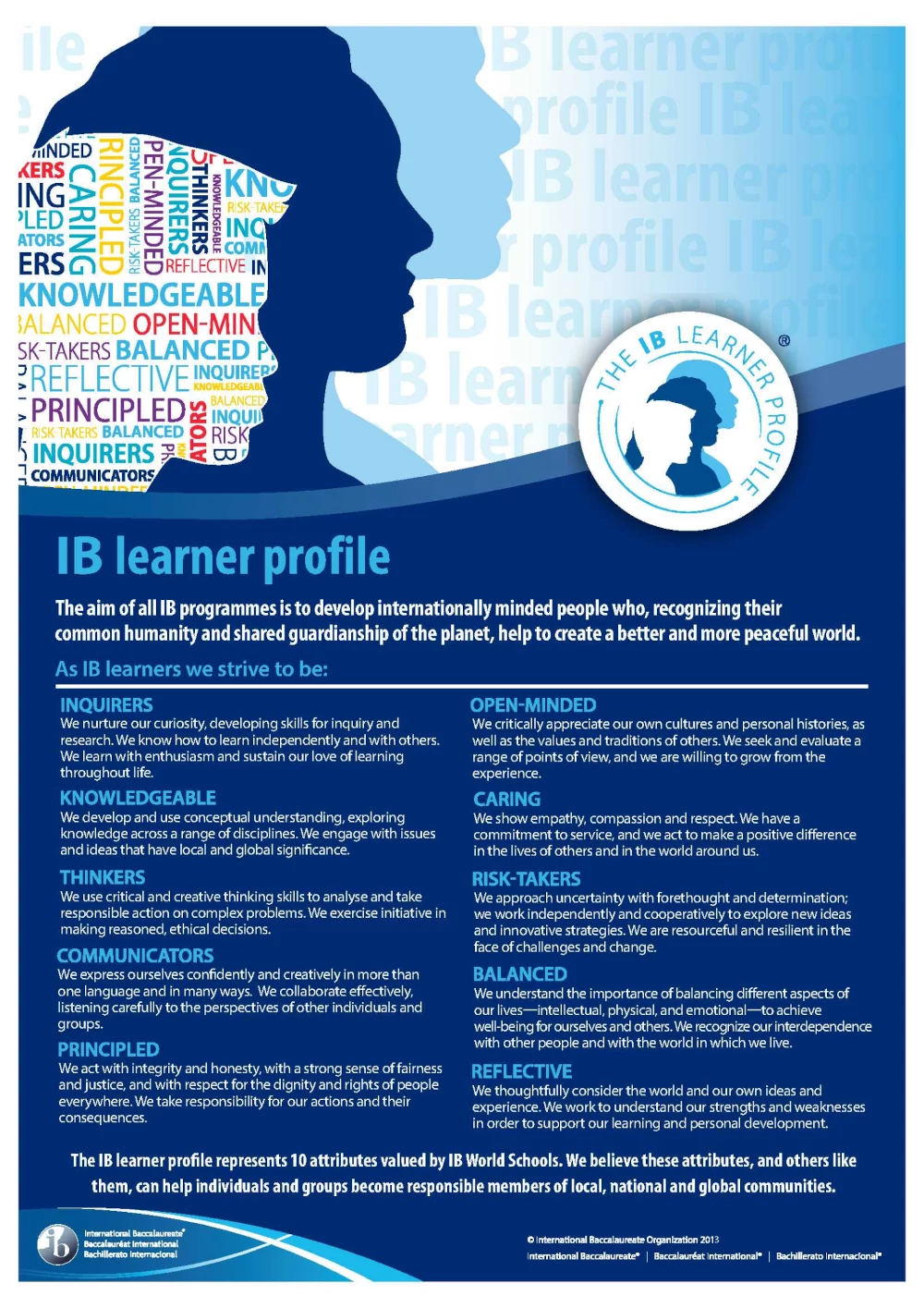
Student action is a core component of the Primary years program. Through taking individual and collective action, students come to understand the responsibilities associated with being internationally minded and to appreciate the benefits of working with others for a shared purpose.
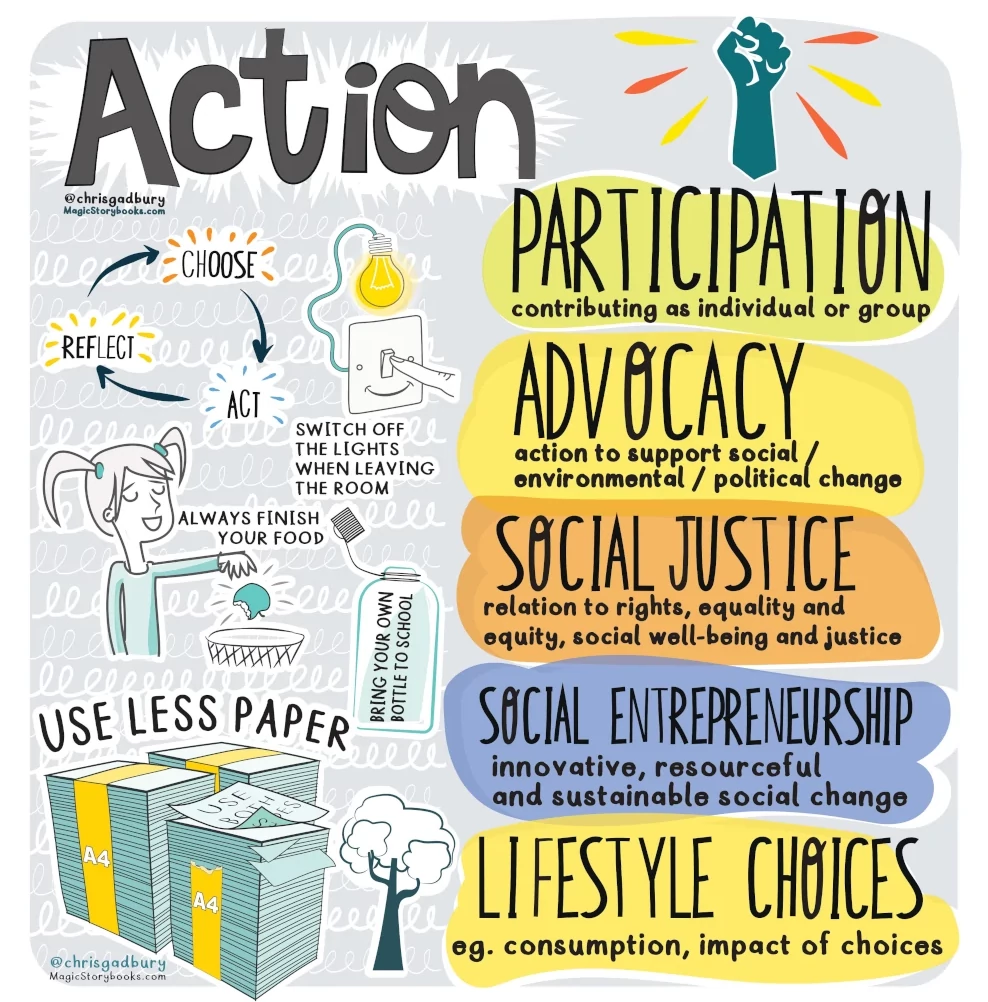
Assessment in PYP is an ongoing process of gathering, analysing, reflecting and acting on evidence of student learning to inform teaching. Assessment involves teachers and students collaborating to monitor, document, measure, report and adjust learning.
At SIS, the learners are assessed based on the knowledge of facts, understanding of the concepts and the development or growth of skills over a period of time. The success criteria are either known to the students or are co-constructed with the learners, allowing them to be involved in the learning process and taking ownership of their own learning.
Assessment in PYPOur reporting system reflects the essential elements and beliefs of the International Baccalaureate Primary Years Program. The two formal written reports, at the end of Term 1 and Term 2, along with our Student led Conferences (SLC) will inform you of your child’s progress.
The Digital Learner Portfolio is a purposeful collection of student work that is designed to identify student growth and provide a continuum for students to track their learning process. Portfolios enable students to reflect on their learning and identify their strengths, as well as areas for improvement, throughout the year. They are used as a communication tool during Student-Led Conferences and parent meetings. Thus, they serve as a means for both documenting and reporting learning in the PYP.
The PYP Exhibition is a collaborative experience that provides students an opportunity to identify, explore & investigate issues of personal interest. In Symbiosis International School, the Exhibition is one of the six Units of Inquiry in Grade 5, wherein students are fully engaged in planning and implementing their inquiries as well as presenting their findings to the school community.
General Regulations PYP
Social Studies
In the PYP, Social studies is viewed as the study of people in relation to their past, their present and their future, their environment and their society.
Through social studies, students develop an understanding of their personal and cultural identities. They develop the skills and knowledge needed to participate actively in their classroom, their school, their community and the world: to understand themselves in relation to their communities. Social studies learning and teaching takes place within the programme of inquiry.
The knowledge component of Social studies in the PYP is arranged into the following five strands: